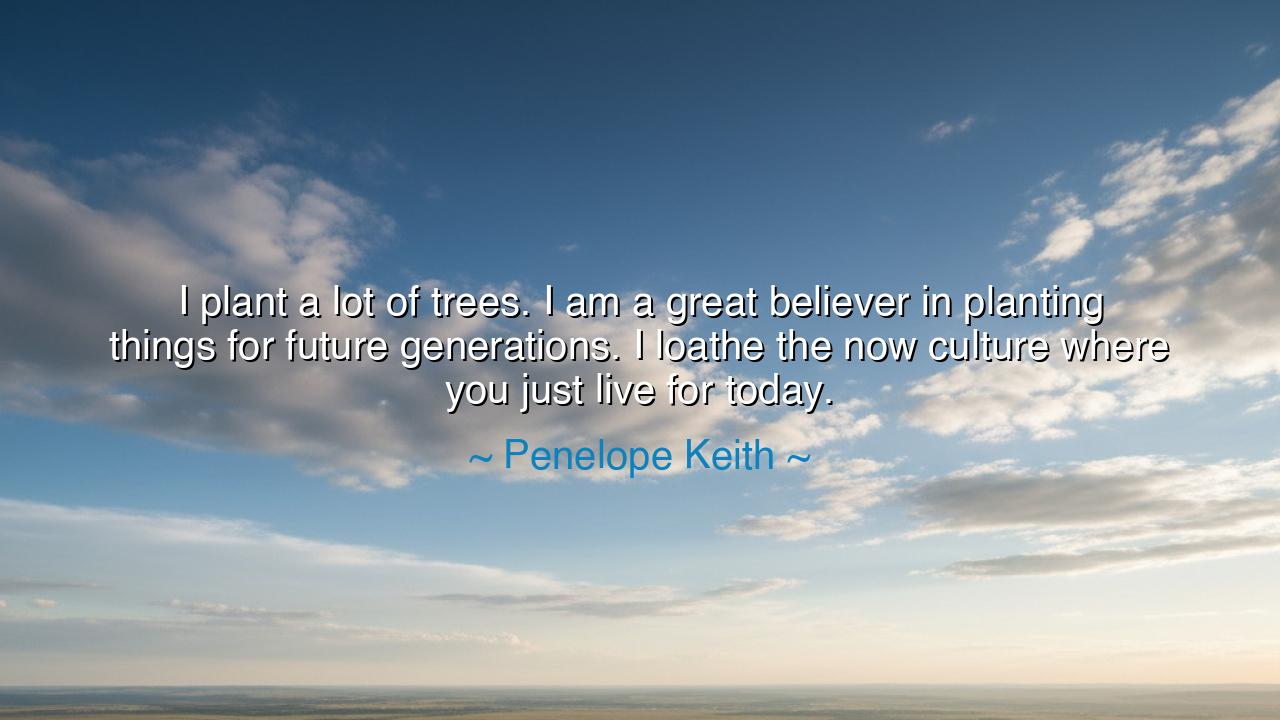
I plant a lot of trees. I am a great believer in planting things
I plant a lot of trees. I am a great believer in planting things for future generations. I loathe the now culture where you just live for today.






The wise and gracious Penelope Keith, actress and lover of the English countryside, once said: “I plant a lot of trees. I am a great believer in planting things for future generations. I loathe the now culture where you just live for today.” In this simple yet profound reflection lies an ancient truth — that the measure of a life well-lived is not what one consumes in the present, but what one leaves behind for those yet unborn. Her words carry the echo of civilizations past, of those who built temples, gardens, and traditions not for their own pleasure alone, but as gifts to eternity.
To plant a tree is an act of faith. It is to labor for something you may never see in its fullness — to give your hands to the soil, knowing that your reward will bloom long after you are gone. In this, Penelope Keith speaks not only of gardening but of a way of life — a philosophy rooted in patience, responsibility, and continuity. The tree becomes a symbol of the enduring bond between generations: its roots reach backward into the past, drawing wisdom from ancestors, while its branches reach forward into the future, offering shade and fruit to descendants.
The origin of this wisdom stretches back to the earliest civilizations. In ancient Greece, it was said that a society grows great when old men plant trees whose shade they know they shall never sit in. The Hebrews, too, recorded a tale of a man planting a carob tree that would not bear fruit for seventy years. When asked why he planted something he would never taste, he replied, “As my ancestors planted for me, so I plant for my children.” In these stories, as in Keith’s words, we find the same sacred rhythm — that true purpose lies not in fleeting pleasure, but in stewardship, in leaving behind something lasting.
To loathe the now culture, as Keith boldly declares, is not to reject the joy of the present moment, but to resist the greed that devours it. The “now culture” she condemns is the restless spirit of modern times — a culture obsessed with immediacy, consumption, and the illusion that fulfillment can be bought or downloaded. It is a world where patience is scorned, and permanence forgotten. Yet the ancients knew that nothing of worth is built in haste. The oak that endures a thousand storms began as a fragile seed tended over years. The cathedrals that inspire awe today were raised stone by stone by men who knew they would never live to see their completion.
Consider the story of Johnny Appleseed, the wanderer of early America, who spent his life scattering apple seeds across the frontier. He did not plant for profit, nor for fame, but for the nourishment of those who would come after him. Many of the orchards that fed settlers generations later grew from his humble labors. In his quiet work we see the same truth that Keith celebrates — that the hands that plant for the future are the hands that truly build civilization. The greatness of any age is written not in its wealth, but in its willingness to care for what it will never claim.
What Penelope Keith reminds us is that each of us has a moral duty to become a caretaker of time. Whether through trees, knowledge, art, or kindness, we must sow what will outlast us. To live only for the day is to shrink our humanity to the size of our appetites. But to live for the future — to think of the faces we will never see, the voices that will one day speak our names — that is to live as the wise have always lived. For in shaping tomorrow, we discover our truest purpose today.
The lesson, then, is clear and enduring: plant something that will live beyond you. It need not be a tree alone. It can be a word of encouragement that inspires another’s courage, a work of beauty that awakens wonder, a deed of kindness that ripples through generations unseen. Resist the fever of the “now culture.” Choose instead the serenity of creation, the patience of growth, the dignity of legacy. For in doing so, you stand among the gardeners of eternity — those who, like Penelope Keith, believe that the soul’s finest expression is not in what it consumes, but in what it gives.
So let her words guide you, as the ancients would guide their children: plant with love, live with foresight, and leave the world richer than you found it. The trees you sow — whether in soil, in hearts, or in ideas — will whisper your name long after you are gone. And in that whisper, you will live again, as every true planter of the future does — not in the fleeting blaze of the moment, but in the quiet, enduring grace of what you leave behind.






AAdministratorAdministrator
Welcome, honored guests. Please leave a comment, we will respond soon